宾语从句公开课教案
宾语从句(公开课)
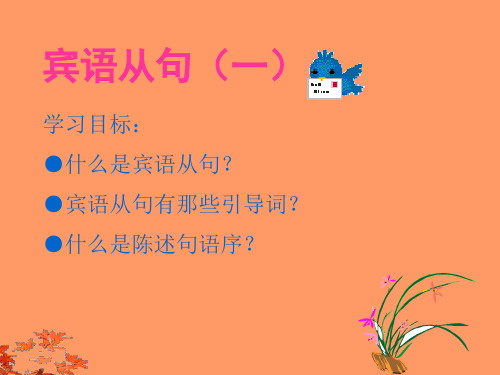
is waiting for Do you know whom he ______ ______ _______?
4.我相信她会算出这道题。 work out I am sure she’ll _________ ________ this problem.
5.我想他还没有戒烟。 don’t _____ think he _____ has given up_____ smoking. I _____ ______ 6.我希望一切顺利。 everything goes I hope _________ __________ well 7. 我想他一定在教室里。 must be I think he _______ _______ in the classroom. 8. 她问你们什么时候出发。 when ________ you would________ start. She asked ________
that they will be back soon. hope _________________
I
that you’re much better today. see ___________________
陈述句作宾语从句,由that引导。从属连词that只起引导作 用,在从句中不作任何成分,常常被省略。
I
see
Байду номын сангаас
you.
You’re on foot today.
你能造宾语从句吗? 一、陈述句做宾语从句。
I
he is right. think that _________________ that she can do it well. hear __________________
初中英语宾语从句教学设计

篇一:宾语从句教案(初中英语样例)教学过程一、复习预习教师引导学生复习上节课所学的人称物主代词,不定代词和疑问代词的用法,(以提问、回顾的形式进行),针对上节课的作业进行讲评、订正、答疑,并通过对疑问代词具体用法的分析和扩展导入本节课所要学习的宾语从句。
二、知识讲解知识点1:宾语从句的连接词的用法在句子中起宾语作用的从句叫宾语从句。
常用的连接词有:that; if; whether; what; which; who; whom; when; where; how; why等。
1. 【考查点】宾语从句是陈述句时,用that引导。
在口语中that常被省略。
如:i know(that) you are a student.2. 【考查点】宾语从句是一般疑问句时,用if或whether来引导。
if, whether意为“是否”,whether还可以与or not连用。
如:lily wanted to know if her grandma liked the handbag.莉莉想知道她的姐姐是否喜欢这个手提袋。
3. 【考查点】宾语从句是特殊疑问句时,用疑问词引导。
如:he didn’t tell me where he was going. 他没告诉我他想去哪儿。
can you tell me what he said just now?你能告诉我他刚才说什么吗?知识点2:宾语从句的语序1. 陈述句变为宾语从句时,要注意人称和时态的变化,语序不变。
如: she said, “ i will leave a message on the desk.”她说她会在桌上留口信的。
she said that she would leave a message on the desk.2.【考查点】一般疑问句和特殊疑问句变为宾语从句时,也要注意人称和时态的变化,后面接陈述句语序。
如:“where are the tickets?” i asked him.我问他票在哪儿。
宾语从句讲解初中教案
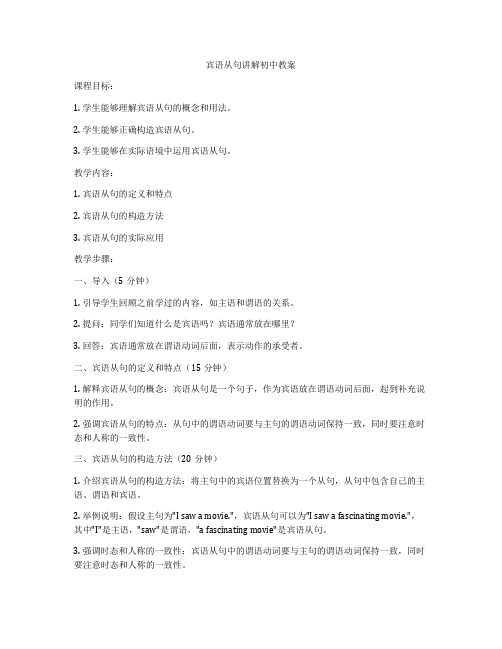
宾语从句讲解初中教案课程目标:1. 学生能够理解宾语从句的概念和用法。
2. 学生能够正确构造宾语从句。
3. 学生能够在实际语境中运用宾语从句。
教学内容:1. 宾语从句的定义和特点2. 宾语从句的构造方法3. 宾语从句的实际应用教学步骤:一、导入(5分钟)1. 引导学生回顾之前学过的内容,如主语和谓语的关系。
2. 提问:同学们知道什么是宾语吗?宾语通常放在哪里?3. 回答:宾语通常放在谓语动词后面,表示动作的承受者。
二、宾语从句的定义和特点(15分钟)1. 解释宾语从句的概念:宾语从句是一个句子,作为宾语放在谓语动词后面,起到补充说明的作用。
2. 强调宾语从句的特点:从句中的谓语动词要与主句的谓语动词保持一致,同时要注意时态和人称的一致性。
三、宾语从句的构造方法(20分钟)1. 介绍宾语从句的构造方法:将主句中的宾语位置替换为一个从句,从句中包含自己的主语、谓语和宾语。
2. 举例说明:假设主句为"I saw a movie.",宾语从句可以为"I saw a fascinating movie.",其中"I"是主语,"saw"是谓语,"a fascinating movie"是宾语从句。
3. 强调时态和人称的一致性:宾语从句中的谓语动词要与主句的谓语动词保持一致,同时要注意时态和人称的一致性。
四、宾语从句的实际应用(15分钟)1. 提问:同学们能否举例说明宾语从句在日常生活中的应用?2. 引导学生思考并回答:例如,当我们询问别人正在做什么时,他们可能会回答"I am reading a book.",这里的"I am reading a book"就是一个宾语从句,作为回答补充说明正在做的事情。
3. 举例展示:给出一些实际语境,如对话、故事等,让学生理解宾语从句在实际语境中的运用。
我初中宾语从句教案

我初中宾语从句教案1. 知识目标(1)使学生掌握宾语从句的定义、用法和语序。
(2)培养学生运用宾语从句进行交际的能力。
2. 能力目标(1)能够正确地判断和运用宾语从句。
(2)能够熟练地运用宾语从句进行日常交际。
3. 情感目标激发学生学习英语的兴趣,培养积极向上的学习态度。
二、教学内容1. 宾语从句的定义和用法宾语从句是一种句子成分,它在句子中作宾语。
宾语从句通常由连接词(如:that, if, whether, who, what, where, when, why, how等)引导,遵循陈述句语序。
2. 宾语从句的语序宾语从句的语序是陈述句语序,即主语+谓语+宾语。
例如:“What he said is true.”(他说的是真的。
)3. 宾语从句的连接词宾语从句的连接词有多种,常见的有:(1)that:只起连接作用,无词义。
例如:“I know that he is busy.”(我知道他很忙。
)(2)if/whether:表示条件或选择。
例如:“Please let me know if you need any help.”(请告诉我如果你需要任何帮助。
)(3)who/whom/whose:表示人及其关系。
例如:“Please pass the book to whoever needs it.”(请把书递给需要的人。
)(4)what:表示事物。
例如:“She wants to know what we are doing.”(她想知道我们在做什么。
)(5)where/when:表示地点和时间。
例如:“I don't know where he lives.”(我不知道他住在哪里。
)(6)why:表示原因。
例如:“He didn't tell me why he was late.”(他没有告诉我他为什么迟到。
)(7)how:表示方式或程度。
例如:“I can't imagine how he managed to do it.”(我无法想象他是如何做到的。
初中语法宾语从句教案
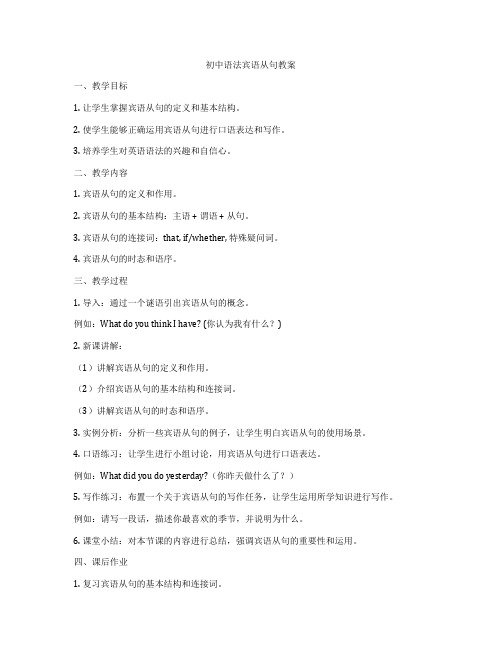
初中语法宾语从句教案一、教学目标1. 让学生掌握宾语从句的定义和基本结构。
2. 使学生能够正确运用宾语从句进行口语表达和写作。
3. 培养学生对英语语法的兴趣和自信心。
二、教学内容1. 宾语从句的定义和作用。
2. 宾语从句的基本结构:主语 + 谓语 + 从句。
3. 宾语从句的连接词:that, if/whether, 特殊疑问词。
4. 宾语从句的时态和语序。
三、教学过程1. 导入:通过一个谜语引出宾语从句的概念。
例如:What do you think I have? (你认为我有什么?)2. 新课讲解:(1)讲解宾语从句的定义和作用。
(2)介绍宾语从句的基本结构和连接词。
(3)讲解宾语从句的时态和语序。
3. 实例分析:分析一些宾语从句的例子,让学生明白宾语从句的使用场景。
4. 口语练习:让学生进行小组讨论,用宾语从句进行口语表达。
例如:What did you do yesterday?(你昨天做什么了?)5. 写作练习:布置一个关于宾语从句的写作任务,让学生运用所学知识进行写作。
例如:请写一段话,描述你最喜欢的季节,并说明为什么。
6. 课堂小结:对本节课的内容进行总结,强调宾语从句的重要性和运用。
四、课后作业1. 复习宾语从句的基本结构和连接词。
2. 完成一个关于宾语从句的练习题。
3. 准备一个关于宾语从句的口头报告。
五、教学评价1. 课堂参与度:观察学生在课堂上的积极参与情况和提问回答。
2. 口语表达:评估学生在口语练习中的表现,是否能正确使用宾语从句。
3. 写作能力:评价学生在写作练习中的表现,是否能正确运用宾语从句。
通过以上教学设计,希望能帮助学生更好地理解和掌握宾语从句,提高他们的英语语法水平。
宾语从句教案模板及范文
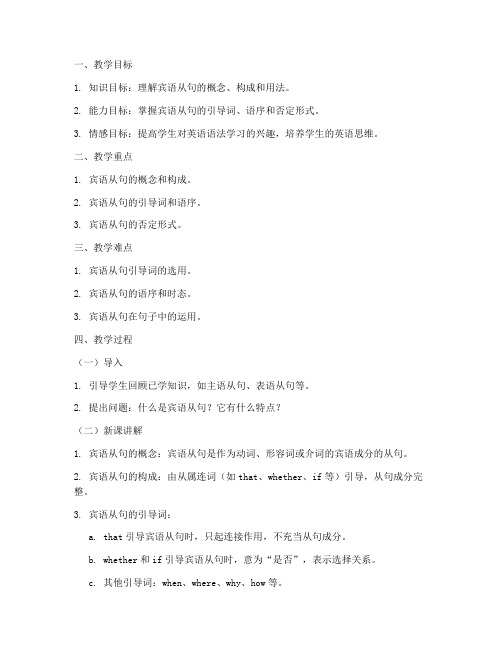
一、教学目标1. 知识目标:理解宾语从句的概念、构成和用法。
2. 能力目标:掌握宾语从句的引导词、语序和否定形式。
3. 情感目标:提高学生对英语语法学习的兴趣,培养学生的英语思维。
二、教学重点1. 宾语从句的概念和构成。
2. 宾语从句的引导词和语序。
3. 宾语从句的否定形式。
三、教学难点1. 宾语从句引导词的选用。
2. 宾语从句的语序和时态。
3. 宾语从句在句子中的运用。
四、教学过程(一)导入1. 引导学生回顾已学知识,如主语从句、表语从句等。
2. 提出问题:什么是宾语从句?它有什么特点?(二)新课讲解1. 宾语从句的概念:宾语从句是作为动词、形容词或介词的宾语成分的从句。
2. 宾语从句的构成:由从属连词(如that、whether、if等)引导,从句成分完整。
3. 宾语从句的引导词:a. that引导宾语从句时,只起连接作用,不充当从句成分。
b. whether和if引导宾语从句时,意为“是否”,表示选择关系。
c. 其他引导词:when、where、why、how等。
4. 宾语从句的语序:与主句保持一致,即陈述语序。
5. 宾语从句的否定形式:在从句中使用否定词(如not、never等)。
(三)课堂练习1. 完成练习题,巩固宾语从句的用法。
2. 小组讨论,互相纠正错误。
(四)课堂小结1. 总结宾语从句的概念、构成和用法。
2. 强调宾语从句在句子中的重要作用。
(五)课后作业1. 复习本节课所学内容。
2. 完成课后练习题。
五、教学反思1. 本节课通过讲解、练习、讨论等多种方式,帮助学生掌握宾语从句的用法。
2. 在教学过程中,关注学生的个体差异,因材施教。
3. 鼓励学生在课后多练习,提高英语语法水平。
范文:一、教学目标1. 知识目标:理解宾语从句的概念、构成和用法。
2. 能力目标:掌握宾语从句的引导词、语序和否定形式。
3. 情感目标:提高学生对英语语法学习的兴趣,培养学生的英语思维。
二、教学重点1. 宾语从句的概念和构成。
初中英语宾语从句公开课教案(优秀版)word资料
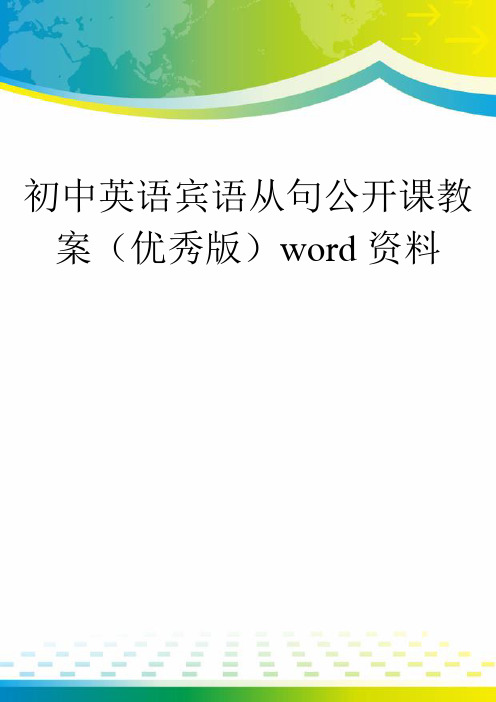
初中英语宾语从句公开课教案(优秀版)word资料课题:The Revise of the Object ClauseTeaching planTeacher :Teaching time: March 13th, 2020Teaching place:Chihe Middle SchoolClass1, Grade9Teaching contents: Object clauseTeaching type: GrammarI. Teaching AimsA. Aims of KnowledgeBy the end of the lesson, Ss will have a better understanding of the object clause.Then Ss will grasp the usage of 3 introductory words: that、if、whether,the tense and word order, etc.B. Aims of AbilityEnable students to identify what is the object clause and learn to use different kinds of introductory wordsC. Aims of EmotionDevelop students’ interest of learning grammar.II. Teaching important pointsExplain the three important aspects of the objective clause: the introductory words, tense and sentence order. Besides, explain the usage of 3 introductory words:that, if, whether..III.Teaching difficult pointsHow to choose the introductory words correctly and appropriately in theobjective clauseIV. Teaching methodsCombine the inductive method with the deductive method.V. Teaching aidstextbook, multimedia and chalksVI. Teaching proceduresStep 1 Warm upPlay a song of Backstreet .Listen to the lyrics carefully and then fill in the blanksStep 2 Lead inPlay a game “whisper”T: I’ll give the first one of each group a piece of paper. Remember the sentence on the paper and pass on the message to the one behind you. Then report what you heard.Step 3 Presentation1. Talk about the following sentences in groups of four. Think about what we should pay attention to object clause: 语序、时态、引导词。
初中宾语从句专讲教案
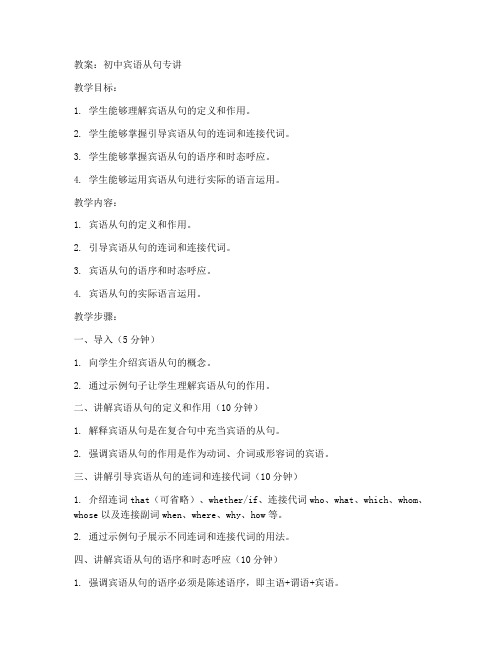
教案:初中宾语从句专讲教学目标:1. 学生能够理解宾语从句的定义和作用。
2. 学生能够掌握引导宾语从句的连词和连接代词。
3. 学生能够掌握宾语从句的语序和时态呼应。
4. 学生能够运用宾语从句进行实际的语言运用。
教学内容:1. 宾语从句的定义和作用。
2. 引导宾语从句的连词和连接代词。
3. 宾语从句的语序和时态呼应。
4. 宾语从句的实际语言运用。
教学步骤:一、导入(5分钟)1. 向学生介绍宾语从句的概念。
2. 通过示例句子让学生理解宾语从句的作用。
二、讲解宾语从句的定义和作用(10分钟)1. 解释宾语从句是在复合句中充当宾语的从句。
2. 强调宾语从句的作用是作为动词、介词或形容词的宾语。
三、讲解引导宾语从句的连词和连接代词(10分钟)1. 介绍连词that(可省略)、whether/if、连接代词who、what、which、whom、whose以及连接副词when、where、why、how等。
2. 通过示例句子展示不同连词和连接代词的用法。
四、讲解宾语从句的语序和时态呼应(10分钟)1. 强调宾语从句的语序必须是陈述语序,即主语+谓语+宾语。
2. 解释主句与宾语从句在时态上的呼应关系,如主句为一般现在时,宾语从句通常也为一般现在时。
五、宾语从句的实际语言运用(10分钟)1. 提供一些练习句子,让学生运用宾语从句进行填空练习。
2. 让学生进行小组讨论,用宾语从句完成对话。
六、总结和复习(5分钟)1. 对本节课的内容进行总结,强调宾语从句的定义、引导词的用法、语序和时态呼应。
2. 提醒学生宾语从句在实际语言运用中的重要性。
教学评估:1. 通过课堂练习和小组讨论,观察学生对宾语从句的理解和运用情况。
2. 在课后作业中加入宾语从句的练习,以巩固所学知识。
教学延伸:1. 进一步讲解宾语从句的复杂句型,如宾语从句中嵌套宾语从句。
2. 结合其他语法点,如情态动词、被动语态等,进行综合语言运用。
以上是针对初中宾语从句专讲的教学教案,通过讲解宾语从句的定义、引导词的用法、语序和时态呼应,以及实际语言运用,帮助学生全面掌握宾语从句的知识。
初中教案宾语从句
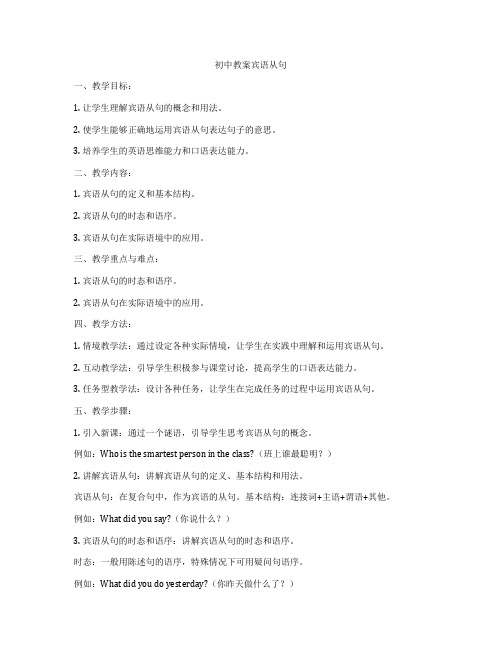
初中教案宾语从句一、教学目标:1. 让学生理解宾语从句的概念和用法。
2. 使学生能够正确地运用宾语从句表达句子的意思。
3. 培养学生的英语思维能力和口语表达能力。
二、教学内容:1. 宾语从句的定义和基本结构。
2. 宾语从句的时态和语序。
3. 宾语从句在实际语境中的应用。
三、教学重点与难点:1. 宾语从句的时态和语序。
2. 宾语从句在实际语境中的应用。
四、教学方法:1. 情境教学法:通过设定各种实际情境,让学生在实践中理解和运用宾语从句。
2. 互动教学法:引导学生积极参与课堂讨论,提高学生的口语表达能力。
3. 任务型教学法:设计各种任务,让学生在完成任务的过程中运用宾语从句。
五、教学步骤:1. 引入新课:通过一个谜语,引导学生思考宾语从句的概念。
例如:Who is the smartest person in the class?(班上谁最聪明?)2. 讲解宾语从句:讲解宾语从句的定义、基本结构和用法。
宾语从句:在复合句中,作为宾语的从句。
基本结构:连接词+主语+谓语+其他。
例如:What did you say?(你说什么?)3. 宾语从句的时态和语序:讲解宾语从句的时态和语序。
时态:一般用陈述句的语序,特殊情况下可用疑问句语序。
例如:What did you do yesterday?(你昨天做什么了?)语序:陈述句语序(S+V+O)或疑问句语序(O+V+S)。
例如:Where is the library?(图书馆在哪里?)4. 实例分析:分析一些宾语从句的实例,让学生更好地理解宾语从句的用法。
例如:(1)I don't know when the party will start.(我不知道聚会什么时候开始。
)(2)Can you tell me where the post office is?(你能告诉我邮局在哪里吗?)5. 练习与互动:设计一些练习题,让学生在课堂上进行互动练习。
初中宾语从句讲课教案

初中宾语从句讲课教案一、教学目标:1. 让学生掌握宾语从句的定义和基本结构。
2. 让学生学会如何将陈述句变为宾语从句。
3. 让学生能够熟练运用宾语从句进行口语表达和书面表达。
二、教学内容:1. 宾语从句的定义和基本结构。
2. 宾语从句的时态和语序。
3. 宾语从句的运用。
三、教学重点和难点:1. 宾语从句的时态和语序。
2. 宾语从句的运用。
四、教学过程:1. 引入:通过提问方式引导学生思考什么是宾语,什么是从句。
2. 讲解:讲解宾语从句的定义和基本结构,让学生明白宾语从句是由疑问词引导的从句,放在谓语动词之后作宾语。
3. 示例:给出一些陈述句,让学生将其变为宾语从句。
如:He knows the answer.(He knows what the answer is.)4. 练习:让学生分组练习,互相提问,将陈述句变为宾语从句。
5. 讲解宾语从句的时态和语序:讲解宾语从句的时态应与主句的时态保持一致,语序为陈述语序。
6. 示例:给出一些时态和语序错误的宾语从句,让学生进行修改。
如:What did he say?(What does he say?)7. 练习:让学生分组练习,互相提问,注意时态和语序的正确性。
8. 讲解宾语从句的运用:讲解如何在实际语境中运用宾语从句,如:询问别人的意见、描述事物的特点等。
9. 示例:给出一些实际语境,让学生运用宾语从句进行表达。
如:What do you think of the movie?(I think the movie is interesting.)10. 练习:让学生分组练习,互相提问,运用宾语从句进行表达。
五、课后作业:1. 复习宾语从句的定义、结构和时态语序。
2. 完成课后练习题,巩固所学知识。
六、教学反思:通过本节课的学习,学生是否掌握了宾语从句的定义、结构和时态语序?是否能够在实际语境中熟练运用宾语从句进行口语表达和书面表达?对于学习有困难的学生,是否需要进行个别辅导?这些都是需要在课后进行反思和改进的地方。
宾语从句讲解之教学案例

宾语从句讲解之教学案例一、教学目标1. 知识目标:本次课程中,学生应该明确宾语从句的概念、用法、特点,并且能够灵活运用宾语从句来完成相关的句子构建。
2. 技能目标:通过多种不同形式的练,学生可掌握如何正确地识别宾语从句,学会如何使用宾语从句完成日常交流沟通,达到熟练掌握宾语从句运用技巧的目标。
二、教学重点1. 掌握宾语从句的定义和特点。
2. 熟悉宾语从句的各种引导词及其运用。
3. 掌握如何通过宾语从句来构建复杂的句子。
4. 熟练掌握宾语从句的综合运用技巧。
三、教学难点1. 引导词的选择。
2. 语序和时态的处理。
3. 怎样在实际交际场景中正确地使用宾语从句。
四、教学方法情境引入法、归纳法、演绎法、示范法、讨论交流法等多种教学方法相结合,以学生为主体,以教师为主导,注重“以学生为主”的教学理念,培养学生积极研究和思考的惯。
五、教学安排1. 课前预(5分钟)介绍本节课要讲的内容,让学生预课文。
2. 导入(10分钟)通过引入故事情境、问题或讨论等方式,激发学生兴趣,为研究宾语从句打下基础。
3. 正式教学(30分钟)1)宾语从句的引导词及其要点讲解。
2)宾语从句的语序和时态处理。
3)宾语从句的复杂句子构造。
4)宾语从句的特点及其综合运用。
4. 练与巩固(10分钟)1)口头练:请学生结合上下文,编造宾语从句。
2)书面练:请让学生完成练册中的相关练。
5. 课堂小结(5分钟)让学生对本节课学到的内容进行总结。
六、教学资源1. 课件、练册、字典等。
七、教学评估1. 本课主要针对宾语从句掌握程度进行评估。
评估方式既包括口头练,也包括书面作业。
2. 评估内容:学生理解掌握宾语从句的能力、正确运用宾语从句的能力等。
宾语从句英语讲课逐字稿

宾语从句英语讲课逐字稿课程名称:宾语从句英语讲课逐字稿课程目标:1. 学生能够理解宾语从句的定义和结构。
2. 学生能够识别并构造不同类型的宾语从句。
3. 学生能够将宾语从句运用到实际的口语和书面表达中。
课程时长:45分钟教学过程:1. 导入(5分钟)- 通过一个简单的日常对话引入宾语从句的概念。
- 例如:"Do you know where the library is?"(你知道图书馆在哪里吗?)2. 宾语从句的定义(5分钟)- 解释宾语从句是作为动词或介词的宾语的从句。
- 强调宾语从句可以回答“谁”、“什么”、“哪里”、“何时”、“为什么”和“如何”等问题。
3. 宾语从句的结构(10分钟)- 展示宾语从句的基本结构:主句 + 连词 + 从句。
- 举例说明不同类型的连词:that, if, whether, who, what, where, when, why, how等。
- 通过填空练习让学生熟悉这些连词的使用。
4. 宾语从句的类型(10分钟)- 介绍宾语从句的三种类型:陈述句宾语从句、一般疑问句宾语从句和特殊疑问句宾语从句。
- 通过例句展示每种类型的结构和用法。
- 例如:- 陈述句宾语从句:I believe that he is honest.- 一般疑问句宾语从句:I wonder if you can help me.- 特殊疑问句宾语从句:I don't know where you live.5. 宾语从句的语序(5分钟)- 强调宾语从句必须使用陈述句语序,即使主句是疑问句。
- 通过对比练习让学生理解陈述句语序和疑问句语序的区别。
6. 宾语从句的时态(5分钟)- 解释宾语从句的时态通常与主句的时态保持一致。
- 通过时间线索图展示不同情况下的时态选择。
7. 互动练习(5分钟)- 分组让学生进行角色扮演,使用宾语从句构造对话。
- 每组选择一个场景,如购物、问路、讨论电影等。
初中宾语从句教案
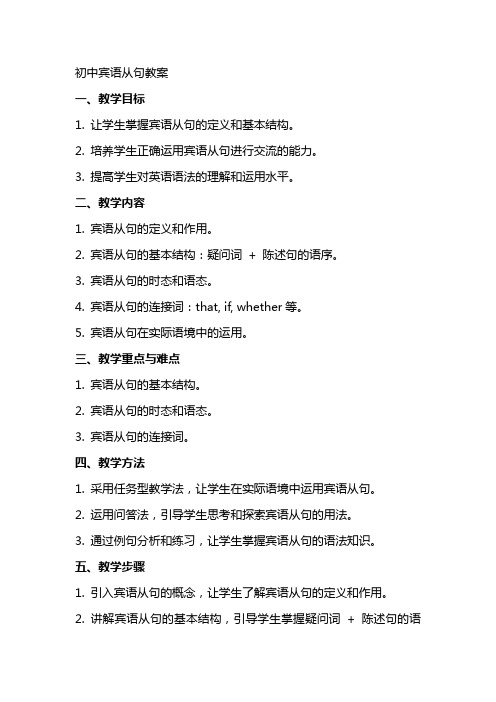
初中宾语从句教案一、教学目标1. 让学生掌握宾语从句的定义和基本结构。
2. 培养学生正确运用宾语从句进行交流的能力。
3. 提高学生对英语语法的理解和运用水平。
二、教学内容1. 宾语从句的定义和作用。
2. 宾语从句的基本结构:疑问词+ 陈述句的语序。
3. 宾语从句的时态和语态。
4. 宾语从句的连接词:that, if, whether等。
5. 宾语从句在实际语境中的运用。
三、教学重点与难点1. 宾语从句的基本结构。
2. 宾语从句的时态和语态。
3. 宾语从句的连接词。
四、教学方法1. 采用任务型教学法,让学生在实际语境中运用宾语从句。
2. 运用问答法,引导学生思考和探索宾语从句的用法。
3. 通过例句分析和练习,让学生掌握宾语从句的语法知识。
五、教学步骤1. 引入宾语从句的概念,让学生了解宾语从句的定义和作用。
2. 讲解宾语从句的基本结构,引导学生掌握疑问词+ 陈述句的语序。
3. 讲解宾语从句的时态和语态,让学生了解宾语从句的时态和语态特点。
4. 介绍宾语从句的连接词,如that, if, whether等,并讲解其用法。
5. 通过例句分析和练习,让学生在实际语境中运用宾语从句。
6. 布置课后作业,巩固所学知识。
教学评价:1. 课后收集学生的作业,检查其对宾语从句的掌握程度。
2. 在下一节课开始时,让学生进行宾语从句的口语测试,评估其运用能力。
3. 观察学生在课堂上的参与度和表现,了解其对宾语从句的兴趣和积极性。
六、教学内容1. 宾语从句的实践应用:日常对话和故事描述。
2. 宾语从句的错误分析:常见错误及其原因。
3. 宾语从句的扩展练习:复杂宾语从句的构建。
七、教学重点与难点1. 宾语从句在日常对话中的应用。
2. 宾语从句在故事描述中的运用。
3. 避免和解决宾语从句的常见错误。
4. 复杂宾语从句的构建和理解。
八、教学方法1. 角色扮演:学生通过模拟日常对话,运用宾语从句进行交流。
2. 故事创作:学生利用宾语从句编写短篇故事,提高语言运用能力。
宾语从句公开课(课件
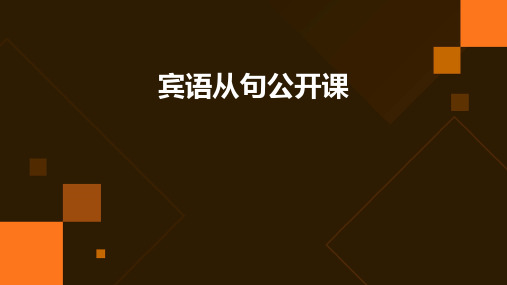
特殊疑问句做宾语从句时,用于表达对特定事物的疑问或关注。
详细描述
特殊疑问句做宾语从句时,通常放在动词或介词之后,形成复合句。例如,“I don't know what time the train will arrive.”(我不知道火车什么时候会到达 。)
选择疑问句做宾语从句
总结词
选择疑问句做宾语从句时,用于表达两种或多种可能性之间的选择。
whether/if
用于一般疑问句,表示是 否的意思,不充当句子成 分。
特殊疑问词
用于特殊疑问句,充当句 子成分,对某一具体内容 进行提问。
02
宾语从句的用法
陈述句做宾语从句
总结词
宾语从句可以用陈述句来表达一个完整的观点或事实。
详细描述
陈述句做宾语从句时,通常放在动词或介词之后,形成一个复合句。例如,“I believe that the sun rises in the east.”(我相信太阳从东方升起。)
一般疑问句做宾语从句
总结词
一般疑问句做宾语从句时,通常用于表达一个疑问或不确定 的观点。
详细描述
一般疑问句做宾语从句时,通常放在动词或介词之后,形成 复合句。例如,“Do you know whether he will come tomorrow?”(你知道他明天是否会来吗?)
特殊疑问句做宾语从句
宾语从句的分类
01
02
03
陈述句作宾语
宾语从句用that引导, that在句子中不充当成分 。
一般疑问句作宾语
宾语从句用whether或if 引导,表示是否的意思。
特殊疑问句作宾语
宾语从句用特殊疑问词引 导,对某一具体内容进行 提问。
宾语从句 优秀公开课教案

宾语从句专练宾语从句(The Object Clause)在复合句中作主句的宾语。
宾语从句通常由下面一些词引导。
1、由that引导(that在口语或非正式文体中常省略)。
2、由what , when , where, which, who, how ,why等连接代词或连接副词引导。
3、由连词whether或if引导(口语中常用if)。
应注意的几个问题:1、宾语从句可放在形容词后。
常用形式是“be+形容词+宾语从句”. I am glad you like it .2、宾语从句与主句时态的一致。
1)主句是现在(或将来)时态时,宾语从句可根据实际需要用不同的时态。
如:He says Mary is playing with the cat .He says Mary often plays with the cat.He says Mary will play with the cat.I think he left yesterday morning.2) 主句时态是一般过去时,从句要用过去时态的某种形式。
He said Mary was playing with the cat.He said he hoped to be back soon..3)当从句所表示的是客观事实或客观真理时,该从句都用一般现在时,不用过去时。
如:He said light travels much faster than sound.3、宾语从句中的否定转移。
如果主句谓语动词是think , believe suppose 等,而从句的意思是否定的,这时主句的谓语动词用否定式,从句用肯定式。
如:I don’t think you are right. 我认为你不对。
4、将普通的特殊疑问句变成宾语从句时,从句的语序要由疑问句变成陈述句的语序。
When will the meeting begin?-------I want to know when the meeting will begin.5、将普通的一般疑问句变成宾语从句时,则用if /whether连接,同时变成陈述句语序。
英语宾语从句教案
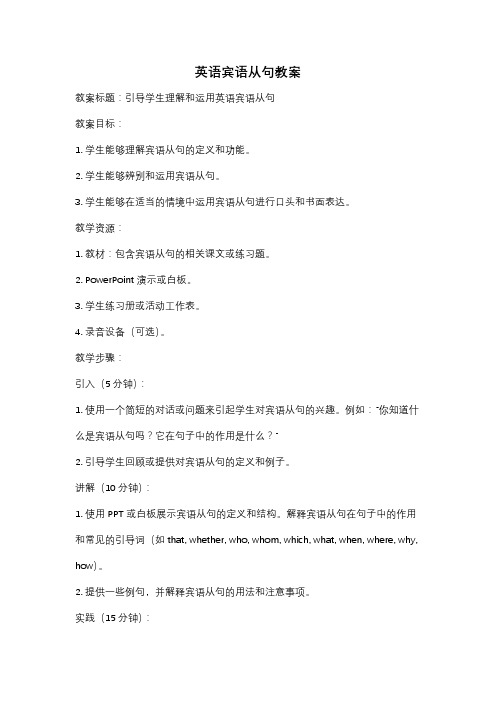
英语宾语从句教案教案标题:引导学生理解和运用英语宾语从句教案目标:1. 学生能够理解宾语从句的定义和功能。
2. 学生能够辨别和运用宾语从句。
3. 学生能够在适当的情境中运用宾语从句进行口头和书面表达。
教学资源:1. 教材:包含宾语从句的相关课文或练习题。
2. PowerPoint演示或白板。
3. 学生练习册或活动工作表。
4. 录音设备(可选)。
教学步骤:引入(5分钟):1. 使用一个简短的对话或问题来引起学生对宾语从句的兴趣。
例如:“你知道什么是宾语从句吗?它在句子中的作用是什么?”2. 引导学生回顾或提供对宾语从句的定义和例子。
讲解(10分钟):1. 使用PPT或白板展示宾语从句的定义和结构。
解释宾语从句在句子中的作用和常见的引导词(如that, whether, who, whom, which, what, when, where, why, how)。
2. 提供一些例句,并解释宾语从句的用法和注意事项。
实践(15分钟):1. 分发练习册或活动工作表,让学生完成一些练习题,以巩固他们对宾语从句的理解和运用能力。
2. 老师可以根据学生的水平和需要,设计不同难度的练习题,包括填空、改写句子和回答问题等。
巩固(10分钟):1. 老师提供一些情境或话题,让学生运用宾语从句进行口头表达。
例如:“请用宾语从句回答这个问题:你认为你的朋友会选什么样的职业?”2. 鼓励学生使用宾语从句进行书面表达,可以是一篇短文或一封信件。
总结(5分钟):1. 概述宾语从句的重要性和应用。
2. 鼓励学生在日常学习和交流中积极运用宾语从句。
扩展活动(可选):1. 让学生在课后阅读英语文章或故事,并标记出其中的宾语从句。
2. 组织学生进行小组讨论或辩论,使用宾语从句表达自己的观点或提出问题。
教学评估:1. 教师观察学生在课堂练习中的表现和参与程度。
2. 批改学生完成的练习册或活动工作表。
3. 评估学生在口头和书面表达中使用宾语从句的准确性和流利度。
初中英语宾语从句教案
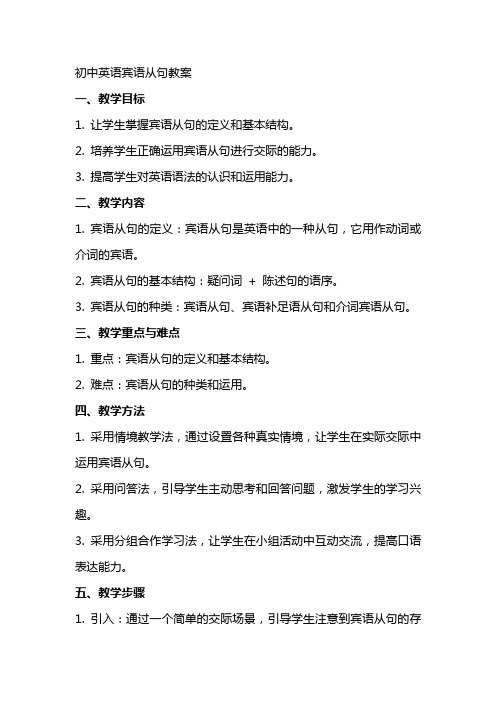
初中英语宾语从句教案一、教学目标1. 让学生掌握宾语从句的定义和基本结构。
2. 培养学生正确运用宾语从句进行交际的能力。
3. 提高学生对英语语法的认识和运用能力。
二、教学内容1. 宾语从句的定义:宾语从句是英语中的一种从句,它用作动词或介词的宾语。
2. 宾语从句的基本结构:疑问词+ 陈述句的语序。
3. 宾语从句的种类:宾语从句、宾语补足语从句和介词宾语从句。
三、教学重点与难点1. 重点:宾语从句的定义和基本结构。
2. 难点:宾语从句的种类和运用。
四、教学方法1. 采用情境教学法,通过设置各种真实情境,让学生在实际交际中运用宾语从句。
2. 采用问答法,引导学生主动思考和回答问题,激发学生的学习兴趣。
3. 采用分组合作学习法,让学生在小组活动中互动交流,提高口语表达能力。
五、教学步骤1. 引入:通过一个简单的交际场景,引导学生注意到宾语从句的存在。
2. 讲解:讲解宾语从句的定义、基本结构和种类。
3. 练习:设计一些练习题,让学生分组进行练习,巩固所学知识。
4. 应用:设计一个角色扮演活动,让学生在实际交际中运用宾语从句。
5. 总结:对本节课的内容进行总结,强调宾语从句的重要性和运用。
六、教学评价1. 通过课堂问答、练习和角色扮演活动,评估学生对宾语从句的理解和运用能力。
2. 观察学生在小组活动中的合作和互动情况,评价他们的口语表达和交际能力。
3. 收集学生的练习作业,对他们的语法正确性和句子结构进行评价。
七、教学拓展1. 引导学生进一步学习其他类型的从句,如定语从句、状语从句等。
2. 结合宾语从句,讲解一些常用关联词的用法,如that, whether, if 等。
3. 组织一些有关宾语从句的额外练习,让学生巩固所学知识。
八、教学资源1. 制作多媒体课件,展示宾语从句的定义和示例。
2. 提供一些宾语从句的练习题和答案,供学生自主学习。
3. 准备一些真实情境的交际材料,用于课堂练习和活动。
九、教学注意事项1. 确保学生掌握宾语从句的基本结构,避免在实际交际中出现错误。
初中宾语从句讲解教案

初中宾语从句讲解教案一、教学目标:1. 让学生理解宾语从句的定义和基本结构。
2. 让学生掌握宾语从句的连接词及其用法。
3. 培养学生正确运用宾语从句进行交际的能力。
二、教学内容:1. 宾语从句的定义和基本结构。
2. 宾语从句的连接词:that, if, whether, who, what, where, when, why, how等。
3. 宾语从句的时态和语序。
三、教学重点与难点:1. 宾语从句的连接词及其用法。
2. 宾语从句的时态和语序。
四、教学方法:1. 采用情境教学法,通过设定生活情境,让学生在实际语境中学习宾语从句。
2. 采用任务型教学法,让学生在完成任务的过程中,巩固宾语从句的知识。
3. 采用互动式教学法,鼓励学生积极参与课堂讨论,提高口语表达能力。
五、教学步骤:1. 引入新课:通过展示一段对话,让学生注意到了宾语从句的存在。
2. 讲解宾语从句的定义和基本结构:宾语从句是句子中作为宾语的部分,由连接词引导,陈述句语序。
3. 讲解宾语从句的连接词及其用法:a. that:表示陈述语气,无实义。
b. if/whether:表示条件或选择,if可以省略。
c. who/what:表示人或者事物。
d. where/when/why/how:表示地点、时间、原因、方式。
4. 讲解宾语从句的时态和语序:宾语从句的时态不受主句影响,根据句意选择。
语序为陈述句语序。
5. 互动环节:学生分组讨论,用所学的宾语从句知识编写对话。
6. 任务环节:让学生运用宾语从句的知识,完成一篇小作文,描述一个场所或事件。
7. 总结与拓展:总结本节课所学内容,布置课后作业,让学生进一步巩固宾语从句的知识。
六、课后作业:1. 复习宾语从句的定义、结构和连接词。
2. 练习运用宾语从句进行交际,编写对话。
3. 写一篇小作文,运用宾语从句描述一个场所或事件。
通过本节课的学习,让学生掌握宾语从句的知识,能够在实际语境中正确运用,提高口语表达和写作能力。
初中英语宾语从句教案

初中英语宾语从句教案一、教学目标1. 让学生掌握宾语从句的定义和基本结构。
2. 培养学生正确运用宾语从句进行口语表达和写作。
3. 提高学生对英语语法的认识和运用能力。
二、教学内容1. 宾语从句的定义:宾语从句是英语中的一种从句,它作为动词或介词的宾语。
2. 宾语从句的基本结构:疑问词+ 陈述句的语序。
3. 常用的疑问词:what, who, where, when, why, how等。
4. 宾语从句的时态和语态:根据主句的时态和语态,宾语从句相应地变化。
5. 宾语从句的连词:that, if, whether等。
三、教学重点与难点1. 重点:宾语从句的定义、基本结构和用法。
2. 难点:宾语从句的时态、语态和连词的选择。
四、教学方法1. 采用实例讲解法,通过具体例子让学生理解宾语从句的定义和用法。
2. 运用练习法,让学生在实际操作中掌握宾语从句的结构和时态、语态的运用。
3. 采用互动教学法,鼓励学生积极参与,提高口语表达和写作能力。
五、教学步骤1. 引入新课:通过一个谜语,引导学生思考宾语从句的概念。
2. 讲解宾语从句的定义和基本结构。
3. 举例说明宾语从句的用法,让学生观察和分析。
4. 讲解宾语从句的时态和语态。
5. 讲解宾语从句的连词。
6. 进行课堂练习,让学生运用宾语从句进行口语表达和写作。
7. 总结本节课的主要内容,布置课后作业。
六、教学评价1. 评价方式:采用课堂表现、练习完成情况和课后作业三种方式进行评价。
2. 评价内容:(1)课堂表现:观察学生在课堂上的参与程度、提问回答情况以及团队合作表现。
(2)练习完成情况:检查学生课堂练习和课后作业的正确率,分析其对宾语从句的理解和运用程度。
(3)课后作业:布置相关的写作任务,让学生运用所学知识进行实际表达,以检验其掌握情况。
七、课后作业1. 抄写本节课所学的宾语从句结构及其关键词,加强记忆。
2. 完成课后练习题,巩固宾语从句的应用。
3. 结合自己的生活实际,编写一个简单的宾语从句句子,明日课堂上分享。
- 1、下载文档前请自行甄别文档内容的完整性,平台不提供额外的编辑、内容补充、找答案等附加服务。
- 2、"仅部分预览"的文档,不可在线预览部分如存在完整性等问题,可反馈申请退款(可完整预览的文档不适用该条件!)。
- 3、如文档侵犯您的权益,请联系客服反馈,我们会尽快为您处理(人工客服工作时间:9:00-18:30)。
公开课教案执教人:撒拉溪中学周礼秀2014年9月17日The teaching contents(教学内容):Object Clauses(宾语从句)The teaching goals(教学目标):1. 掌握宾语从句的慨念,构成和用法.2. 掌握宾语从句的三类引导词3. 掌握宾语从句的时态变化4. 掌握宾语从句的语序The teaching important points(教学重点)1.宾语从句的慨念2.宾语从句的引导词3.宾语从句的语序4.宾语从句的时态变化The teaching difficult points(教学难点)1.宾语从句的时态变化2.if和wether的区别3. when与if的用法The teaching process(教学过程)Step 1.Lead-in复习书上的内容导入新课(P9), (叫学生划分这些句子的成分,引出该堂课的教学内容——宾语从句)Step 2. Presentaion一.概念:置于动词、介词等词性后面起宾语作用的从句叫宾语从句。
如:, He said he was good at drawing. (动词宾语)He began to think about what he should do. 他开始考虑应当怎样做。
(介词宾语)。
(此外,除了谓语动词、介词能带宾语从句外,动词不定式,动名词形式后面也能带宾语从句,还有些形容词(afraid,sure,glad等)之后也可以带宾语从句。
)二.结构:主语+谓语+连接词+宾语从句三.种类:根据引词不同,宾语从句可分为三类。
1.由that引导的宾语从句。
如果宾语从句是由陈述句充当,用that引导,that 无词义,在口语或非正式文体中常省略。
如:The teacher said (that) he is a good student .The teacher said (that )the earth goes round the sun.。
The teacher said (that) light travels much faster than sound.(举此例是为下面讲时态作铺垫)2.由if或whether引导的当宾语从句。
如果宾语从句是由一般疑问句充当,就用if或whether引导,意为“是否”。
如:I don't know if /whether it will rain today。
在宾语从句中,if和whether通常可以互换,但在下列情况下只能用whether:①在具有选择意义,尤其是直接与or not连用时,往往用whether(if…or not 也可以使用)。
如:I don't know whether or not it will rain today。
(=I don't know if it will rain or not today。
②在介词之后用whether。
如:I’m thingking about whether it will rain today.③若用if会引起歧义时,则用whether。
如:Please let me know if it will rain today.可理解为:a.Please let me know whether it will rain today.请告诉我今天会不会下雨。
b.If it will rain today.,please let me know.如果今天会下雨,请告诉我。
④whether置于句首时,不能换用if。
如:Whether it will rain or not today,Ican't say.今天会不会下雨,我说不上来。
⑤引导主语从句和表语从句时宜用whether。
如:Whether it will rain or not today is still a question.今天会不会下雨还是个问题。
The question is whether it will rain or not today.问题是今天会不会下雨。
⑥在不定式前用whether。
如:I haven’t decided whether to go to Beijing in National Day.(= I haven’t decided to whether/if I would go to Beijing in National Day.3.由特殊疑问词引导的宾语从句。
如果宾语从句是特殊疑问句,只需用原来的特殊疑问词引导。
如:I want to know how you studied English before.I want to know why he didn’t come yesterday.I want to know where he will go tomorrow.I want to know what you are doing now.I want to know what you were doing this time yesterday.I want to know when you go to school in the morning.She wanted to know how you studied English before.She wanted to know why he didn’t come yesterday.She wanted to know where he would go tomorrow.She wanted to know what you were doing then.She wanted to know what you were doing this time yesterday.She wanted to know when you go to school in the morning.She wanted to know what your names are.注意:if和when既可以引导宾语从句,也可以引导状语从句,应注意它们在两种从句中的意思和用法的不同。
if和when引导宾语从句时,分别意为“是否”和“何时”,其时态应和主句时态相呼应;它们引导状语从句时,意思分别为“如果,假如”和“当……时候”,当主句时态是一般将来时时,其时态用一般现在时。
因此,遇到它们就要认真分析一下,它们究竟是引导什么从句。
如:If it rains tomorrow, I won’t come.(时间状语从句)I don’t know if it will rain tomorrow. (宾语从句)I want to know when you go to school in the morning. (宾语从句)When you go to school,please tell me. (时间状语从句)4.归纳总结:①当宾语从句是由陈述句充时,用that引导;②当宾语从句是由一般疑问句充当时,用if或whether引导;③如果宾语从句是特殊疑问句,只需用原来的特殊疑问词引导。
四. 时态(一致性原则)引导学生从所举例子当中归纳总结得出:含宾语从句的复合句,主、从句谓语动词的时态呼应应包括以下三点内容:1)如果主句的谓语动词是一般现在时,从句的谓语动词可根据需要,选用相应的任何时态。
3)如果宾语从句所表示的是客观事实、普遍真理、自然现象或习惯性动作等,不管主句用什么时态,从句时态都用一般现在时。
如:五.语序:陈述句语序。
(引导学生从例子中归纳总结得出)六. 宾语从句的否定转移。
当主句的谓语动词为think, guess, suppose, believe等,且主语为第一人称时,从句若表示否定,一般将否定词not转移到主句的谓语中,这就叫作“否定转移”。
如:“我认为他不是一个好学生”这句话不能说成I think (that) he is not a good student.而是要说成I don't think (that) he is a good student.但是如果动词为非一般现在时或主语不是第一人称时,否定不转移。
如:She thinks(that)he is not a good student.I thought ( that) he is not a good student..七.从句的简化1. 当主句谓语动词是find,see,watch,hear等感官动词时,从句常简化为“宾语+宾补”结构,宾补为不带to的不定式或V-ing形式。
如:She found that the wallet was lying on the ground.→She found the wallet lying on the ground.2. 当主句谓语动词是hope,wish,decide,forget,plan,agree等,且主句主语与从句主语相同时,从句可简化为不定式结构。
如:She agreed that she c ould help me with my maths. →She agreed to help me with my maths.3. 在连接代词/副词引导的宾语从句中,当从句主语与主句主语或间接宾语一致时,宾语从句可简化为“连接代词/副词+不定式”结构。
如:Can you tell me how I can get to the station? →Can you tel l me how to get to the station?八.人称的变化和标点的使用(八年级学直接引语转化成间接引语时讲过,这里不重点讲,只作简单的复习)1. 从句的主语如果是第一人称,变为宾语从句则与主句的主语一致;如果是第二人称,则与主句的宾语一致;如果是第三人称,不用变化。
如:“May I use your knife?” He asked me. →He asked me if he might use my knife.“Do you know her telephone number?” He asked me.→He asked me if I know her telephone number.2. 宾语从句的标点均由主句决定。
主句是陈述句,用句号;主句是疑问句,用问号。
如:Who will give us a talk? I don’t know. →I don’t know who will give us a talk.Do you know? Where does he live? →Do you know where he lives?Step 3、Practice【中考范例】1. Miss Green didn’t tell us _______ in 2002.A. where does she liveB. Where she livesC. where did she liveD. where she lived (北京市中考试题)【解析】答案:D。
